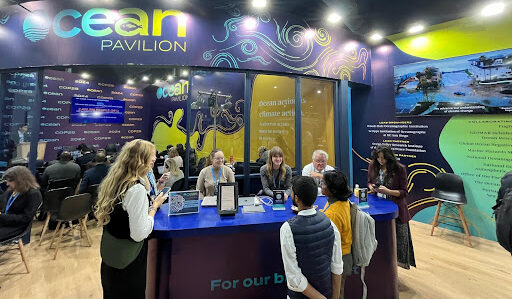NORTHAMPTON, MA / ACCESSWIRE / December 11, 2024 / Logitech

Vanessa Minnis (brown sweater on the left), Scripps PhD Student
Logitech is proud to support the students of UC San Diego's Scripps Institution of Oceanography in traveling to the 2024 UN Climate Conference in Baku, Azerbaijan. These inspiring researchers will showcase their innovative solutions to address the ocean and global climate crisis. Our goal is to foster collaboration between the next generation of leaders and current policymakers, ensuring their perspectives are considered in shaping the future of climate action.
The 29th Conference of the Parties (COP29) gathers experts, scientists, policymakers, and activists from around the world. This year's focus is on providing financial support for developing countries to cut greenhouse gas emissions while handling climate catastrophes.
Scripps delegates are highlighting research on carbon, technology, financial solutions, and interdisciplinary strategies for a rapidly changing ocean. The opportunity to engage in meaningful conversations with international climate negotiators will allow students to share ideas on ocean science and climate solutions.
By helping students get to Baku, we hope to provide them with a platform to highlight their incredible work. It is crucial to empower young voices, as they are the next generation of climate leaders who will drive the movement to a sustainable future.
Logitech reached out to Vanessa Minnis, a Scripps PhD Student, who shared her excitement about this incredible event:
1) What are you looking forward to most at COP29?
I look forward to attending and participating in COP29 as it provides a platform to engage with global leaders and innovators in climate solutions. My research specifically looks at how microbes can be added into soils in order to increase the amount of atmospheric carbon dioxide being drawn down into the soil. Through COP 29, I hope to gain insights into how international policies and grassroots initiatives can be aligned to my research on a global scale, while also exploring opportunities to integrate my research with large-scale carbon reduction strategies that are being discussed at the conference. I'm also excited to meet individuals from around the world and engage in meaningful conversations on global climate action.
2) Why is a conference like this so important for the climate crisis?
This conference is crucial because it's one of the few events where countries from all over the world gather on a global stage to discuss climate change. As a student, I find it incredibly valuable because it exposes me to how climate negotiations unfold and helps me understand the impact of these discussions on both research and the financial strategies used to address climate change.
3) What are you hoping to take away from COP29, both personally and professionally?
Personally, I really want to understand the dynamics between climate policy, research, and funding opportunities. Exploring these connections will help me identify where the gaps are and what strategies I might be able to employ in my own research to bridge them.
Professionally, I want to learn how cutting-edge climate solutions are being implemented on the ground, particularly those that could be scaled globally. Additionally, I hope to meet leaders and experts whose insights will open my eyes to new perspectives and foster potential collaborations.
4) As a PhD student at the forefront of climate research, what do you think are the biggest obstacles we need to overcome to effectively address the climate crisis?
One of the biggest obstacles that comes to mind is not having the technology available to keep up with the frequency of measurements needed in order to accurately predict how effective climate mitigation strategies are. Coming from a soil research background, I experience firsthand the challenges of needing to collect data myself on-site. This quickly becomes problematic due to the time-consuming nature of the work, the strain on resources, and the limitations it places on the scale and frequency of data collection. This highlights a broader issue: the critical need for accessible funding and support for climate-oriented research. Such support is vital not only for developing advanced technologies, but also for training the next generation of scientists who are crucial to continuing our innovation and refinement of approaches to tackle climate change effectively. Moreover, engaging more effectively with policymakers is essential to ensure that our scientific findings are translated into actionable climate policies, which will help to address the climate crisis from all angles.
5) What advice would you give to other students or young researchers who are passionate about climate solutions but may not know where to start?
Stay informed and do not get disheartened by all the events and headlines you read regarding climate change. There are so many ways to approach combating climate change, so finding your passion within the field, whether it's sustainable agriculture, renewable energy, or ocean warming can help guide you. This will also help you connect with local organizations that align with your interests. Look for community groups and local initiatives through social media, local community boards, or school clubs. If you are a student or young researcher, taking classes or attending seminars on varying aspects of climate change from policy to biology can also help increase your depth of knowledge.
Thank you, Vanessa!
Logitech is proud to help young researchers take a seat at the table, recognizing that action is more important than ever. From big corporations to individuals, we must take proactive steps in order to help save our planet.
View additional multimedia and more ESG storytelling from Logitech on 3blmedia.com.
Contact Info:
Spokesperson: Logitech
Website: https://www.3blmedia.com/profiles/logitech
Email: [email protected]
SOURCE: Logitech
View the original press release on accesswire.com